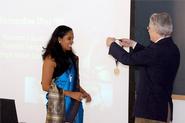
Mary (Bernardine) Dias '98 was featured in a January 30 SciDev.net article titled "Learning to listen: technology and poor communities," about TechBridgeWorld. It is the initiative she founded in 2004 to forge collaborations between Carnegie Mellon University (CMU) and developing communities around the world in order to promote innovative ways of using technology in poor communities.
Dias is a Sri-Lankan born scientist based at CMU, where her focus is on robotics. Dias believes the kinds of relationships formed through TechBridgeWorld benefits both partners: university staff and students learn about the real needs of the world's poor, while communities gain skills and access to technology. Ongoing projects of TechBridgeWorld include using technology to improve healthcare in Haiti and to teach English to students in Ghana. When Dias moved to Qatar to teach at CMU's recently launched local branch (CMU-Q), she brought the project with her. As well as introducing TechBridgeWorld to Qatar, Dias plans to use the country as a springboard to expand into developing communities in Asia and elsewhere in the Middle East.
In the article, Dias stresses the importance of listening to local communities and developing partnerships with non-governmental organizations. "Because I grew up in Sri Lanka, I know about experts who have flown in and stayed at five-start hotels for a month, used all the money and come up with solutions that has no relevance at all...First, which is obvious, you can't design a solution without grasping the problem—in technology or any other discipline. Secondly, several developing countries have been around for so long, and they managed to live in sync with their environments. We need to learn more about this, not only when designing technology solutions for these communities, but for designing technology solutions in general."
Dias also hopes, through TechBridgeWorld, to use technology to improve healthcare in rural clinics that lack resources. Currently, the program is exploring a low-cost project to digitally connect well-equipped hospitals in cities to the distant clinics, so digital photos of patients could be sent to better-trained physicians in the main hospital. Under the umbrella of TechBridgeWorld, two new courses – both focused on technology consulting for communities, particularly poor ones – will be introduced to undergraduate students at CMU-Q's school of computer science. As ever, they uphold Dias's belief in mutuality when it comes to encounters between the West and the developing world. As she says: "The most important thing students and faculty walk away with from these courses is the realization that you can't be an expert on everything, and that you need to listen to, and learn from, your partners in local communities."
-- by Laura Trubiano '07
Posted January 31, 2006
